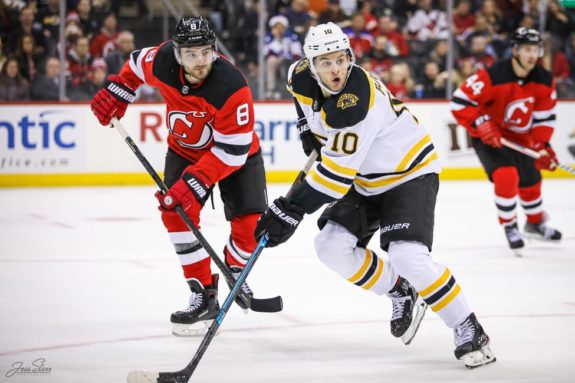Anders Bjork has been a bright spot for the Boston Bruins this season. In his first full NHL season, Bjork if finally clear (knock on wood) of the injuries that have nagged him for the past two seasons, and his quality of play has reflected a level of growth that the Bruins should be excited about.
What’s more, Bjork’s progression over the last few seasons demonstrates the value of patience. In today’s NHL, which is faster, younger, and more skilled than ever before, Bjork’s story resonates. He’s proof that, while the Connor McDavids of the world are expected to make an instant impact, there’s still value in giving players time to grow into their potential.
Bjork’s Growth
A quick look at Bjork’s career stat lines may not reveal a significantly higher quality of play this season, but the Mequon, Wisconsin native’s increased impact has been noticeable on the ice.
After two injury-plagued seasons, when Bjork jumped between Boston and the team’s American Hockey League affiliate in Providence, he finally seems to have cemented his place as an NHL regular. That hasn’t come quickly, or easily.

Bjork was assigned to Providence at the start of this season, but quickly earned himself another shot with the varsity club. Eight points in the P-Bruins’ first seven games earned him a quick call up on Oct. 25, and he’s been with the parent club ever since. It’s easy to see why.
The biggest flaw in the former Notre Dame standout’s play over the past two seasons has been his strength. That, and perhaps naivety, are what led to his shoulder injuries; he was punished for putting himself into dangerous positions.
But Bjork has beefed up his strength and has learned to make plays that no longer expose him to the heavy hits. It’s a dog-eat-dog league, and if you put yourself in dangerous positions, bad things are going to happen. Bjork learned that the hard way, but the important thing is, he’s learned it.
It’s been a two-way win for Bjork, whose strength and smarts have allowed him to not only stay healthy but also make plays that wouldn’t have been possible last season. The 6-foot winger has been noticeably stronger on the puck this campaign, allowing him to produce plays like this one against the Philadelphia Flyers earlier this month:
All the while, Bjork hasn’t sacrificed the basic elements of his game. His skating ability – and speed in particular – is still a big part of his game. He’s a naturally creative player, and he’s always had a dangerous shot:
Bjork’s player profile offers a few benefits for the Bruins. His versatility allows him to play on both sides of the ice – albeit a little more comfortably on the left – which is important when deciding which gaps to fill down the stretch. That said, he’s spent most of his time on the right side, and the bump in his play this season could make him a viable option to fill Boston’s everlasting second-line, right-wing hole.
It’s a role that was worrisome for the Bruins in the past. (from ‘Bruins winger Anders Bjork thriving in latest opportunity, Patriot Ledger, 12/26/2019) Bjork was often injured by cutting through the middle of the ice from his off-wing. He’s now focused on making safer plays to produce from the right side. Using him on the second line on the right wing is something that the Bruins should consider over the next few months.
Bjork’s versatility has been evident in other aspects of his game as well. He’s a scorer at heart, and his main role has been point production, but head coach Bruce Cassidy has trusted him with stints on the penalty kill this season.
His game has taken the next step this season, and while there have been whispers that he could become part of a trade-deadline package, you could make a solid case for keeping him in Boston.
Patience in Today’s NHL
The changing look of the league, and the realization that championship teams often need very good players on cheap contracts (what’s more affordable than entry-level deals?), can lead to an urgency to rush prospects through the system and into the spotlight at a very young age.
Lately, the Bruins have done pretty well with young players. Several players drafted after Bjork have already established themselves as impact NHLers: Jake DeBrusk and Brandon Carlo were 2015 picks, and Charlie McAvoy was drafted in 2016. David Pastrnak and Danton Heinen were both drafted the same year as Bjork, in 2014, and are both regular names (an All-Star in the case of Pastrnak) in black and gold.

So where does that leave Bjork? The 2014 fifth-round pick didn’t skip into the NHL with ease like Aaron Ekblad, the first-overall pick from that year. He didn’t make his NHL debut until he was 21, and was injury-prone over his first two seasons, which could’ve been a cause for concern for the Bruins. Now, he’s playing his first full season at 23.
He was a prospect with obvious talent, but one who needed some work in areas of his game, and struggled to stay healthy. But now, he’s budding into a very competent NHLer with top-six potential.
It’s a testament to patience in a league that has grown more and more accustomed to a quick return on investment. The Bruins played the waiting game with Bjork, and now, it’s starting to pay off.